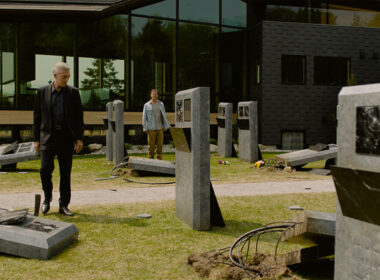From the plucked, muted violin notes of the intro to its ambiguous, triumphant final scene, İlker Çatak’s The Teachers’ Lounge is an enthralling schoolyard thriller.
Idealistic young teacher Carla Nowak (played with anxious intensity by Leonie Benesch) is a new arrival at a German secondary school. Well-meaning and empathetic, she is the conductor of a peaceful classroom. A shot of Carla from behind, her arms beautifully outstretched, suggests this is her daily orchestra. She is organised and dedicated, if a touch closed off from her fellow teachers.
But when a student of Turkish origin is accused of stealing money, and Carla’s own surveillance of the teachers’ lounge indicates the guilt of Friederike Kuhn, an administrative staff member, we realise she’s far from in control. Carla’s star pupil, Lukas (Mrs Kuhn’s son), resents the accusation aimed at his mother. The students rally around him and the teachers, divided by internal disagreements, seem almost powerless to assert control.
Long gone is the strict discipline of The 400 Blows or Dead Poets Society. The students in the film seek neither escape to the outside world nor solace in the rich inner worlds sparked by poetry. As they have been taught, these students seek answers. They seek justice. As the editor of the student newspaper boldly declares that, outside of truth, “everything else is just PR.”
The path to maturity for the students seems not to lie in compromising their ideals but in sticking to them ever more fiercely. It’s a wonderful inversion of what the Germans call “Bildung,” the tradition which examines the formative years of youth, marked as it is by a certain moral education. But the students cede no ground. They are uninterested in the murky give-and-take of the adult world. Their world is zero sum.
Indeed, it is the teachers’ uncertain sense of themselves as disciplinarians and moral leaders that provides so much fuel for the plot. They do not know who they are, and the students grasp it quickly. Carla in particular has ideals, but does she really believe in them? Çatak satirises the speed at which the right to privacy, freedom of the press, and the concept of innocent until proven guilty are upended in the search for a thief. It’s quite an achievement, especially given that thrillers are rarely satirical, and satires seldom thrilling.
The film moves so briskly that viewers can be forgiven for failing to notice that on Carla’s surveillance video, Mrs Kuhn’s blouse is patterned with little stars. It’s a knowing nod to Germany’s tragic past. That Mrs Kuhn also represents a slightly different power struggle within the school – between the teachers and the administrative staff – adds more complexity to The Teachers’ Lounge. One can only hope that the next films concerning the consequences of accusation are so richly engaging.
Verdict: Five stars




